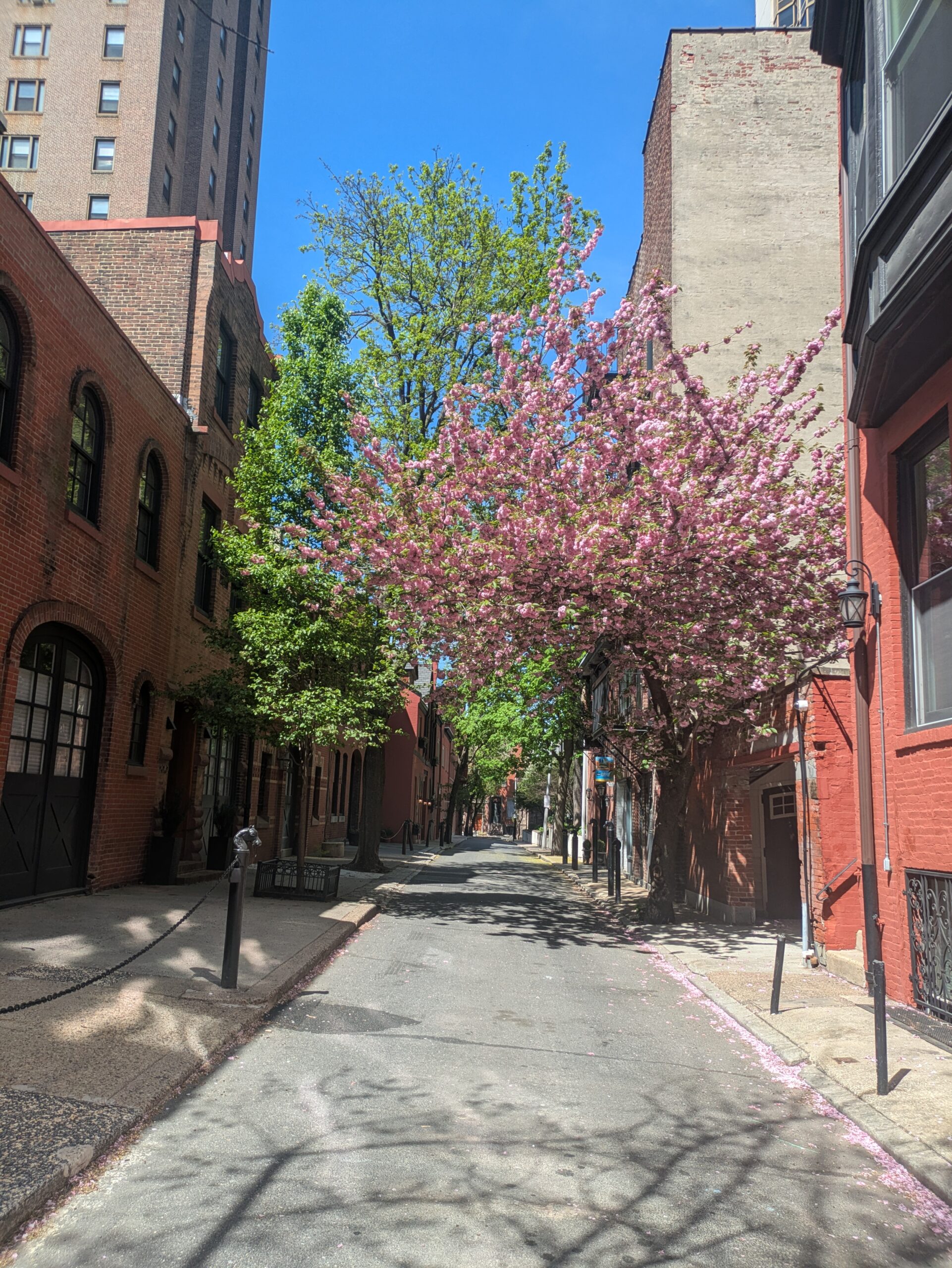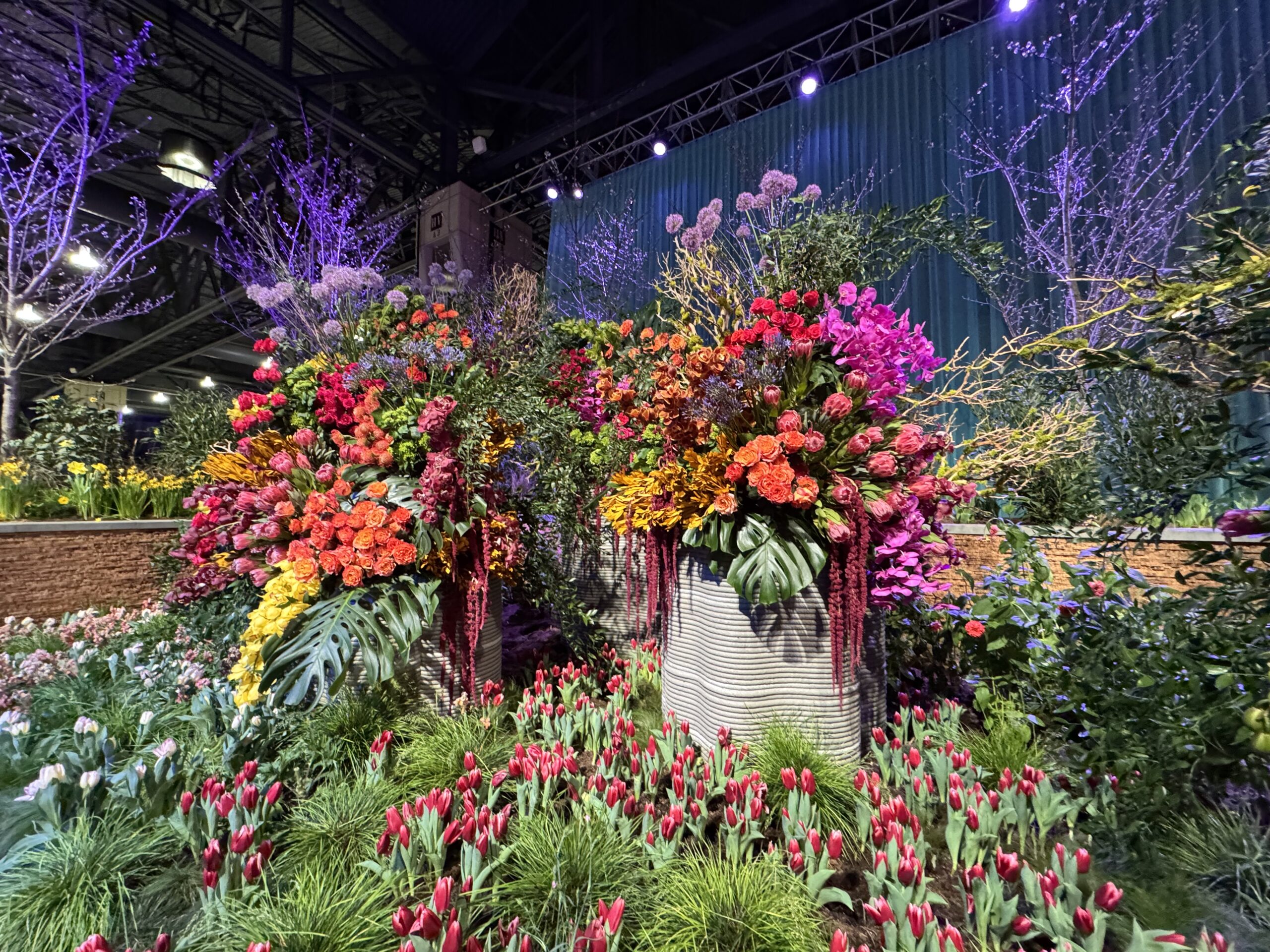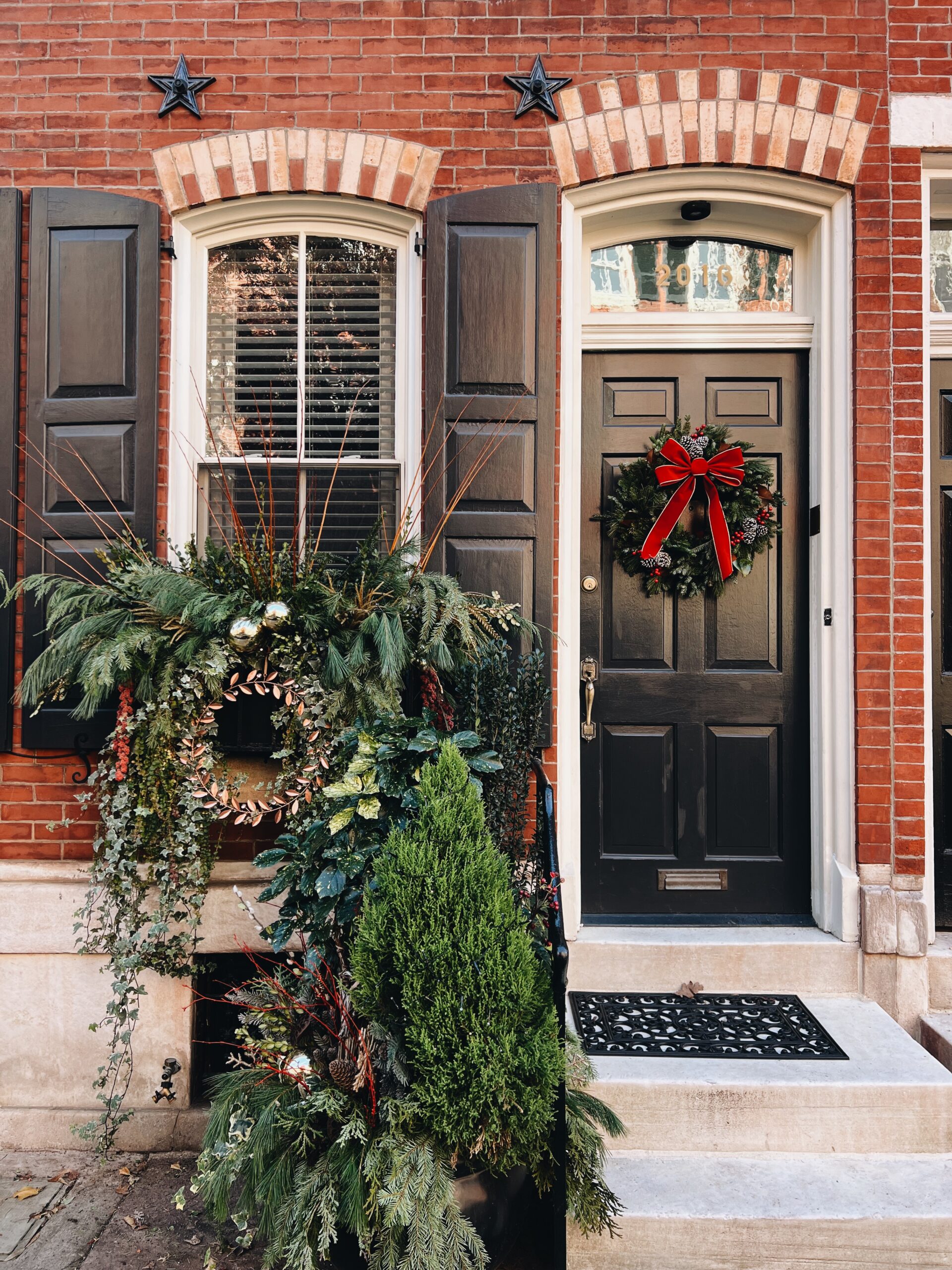sustainability
Sustainable Kitchen

Illustration of Philadelphia kitchen, with cabinets, shelves, and plants. Image: Greg Dyson for Solo Real Estate
If one of your New Year’s resolutions is to eat healthier and live a more sustainable lifestyle, you may want to start with your kitchen as produce and kitchen supplies tend to generate a lot of waste. To help get you started, we talked with Philadelphia experts about local food, herbs, and sustainable home goods.
Sustainable Kitchen Starter Kit
If you want to start or expand your kitchen’s sustainability, visit Good Buy Supply, 1737 E. Passayunk Avenue, South Philly’s eco-friendly general store. Emily Rodia, who co-founded the shop with her husband Jason Rodia, has everything you need for a plastic-free kitchen.
“Start by replacing traditional kitchen items with more sustainable choices,” said Emily who recommends swapping your plastic sponge for a compostable one. She also suggests replacing your plastic dish brush with one that has a bamboo or wooden handle and plant fibers for the brush.
At Good Buy Supply, you can replace paper towels and plastic baggies with reusable thin cotton unpaper towels and reusable, medical-grade, silicone stasher bags. “You can cook and microwave in stasher bags and put them in dishwasher,” said Emily. If you use plastic wrap, tin foil, or plastic baggies to store half-used veggies in the fridge, consider silicon food huggers.
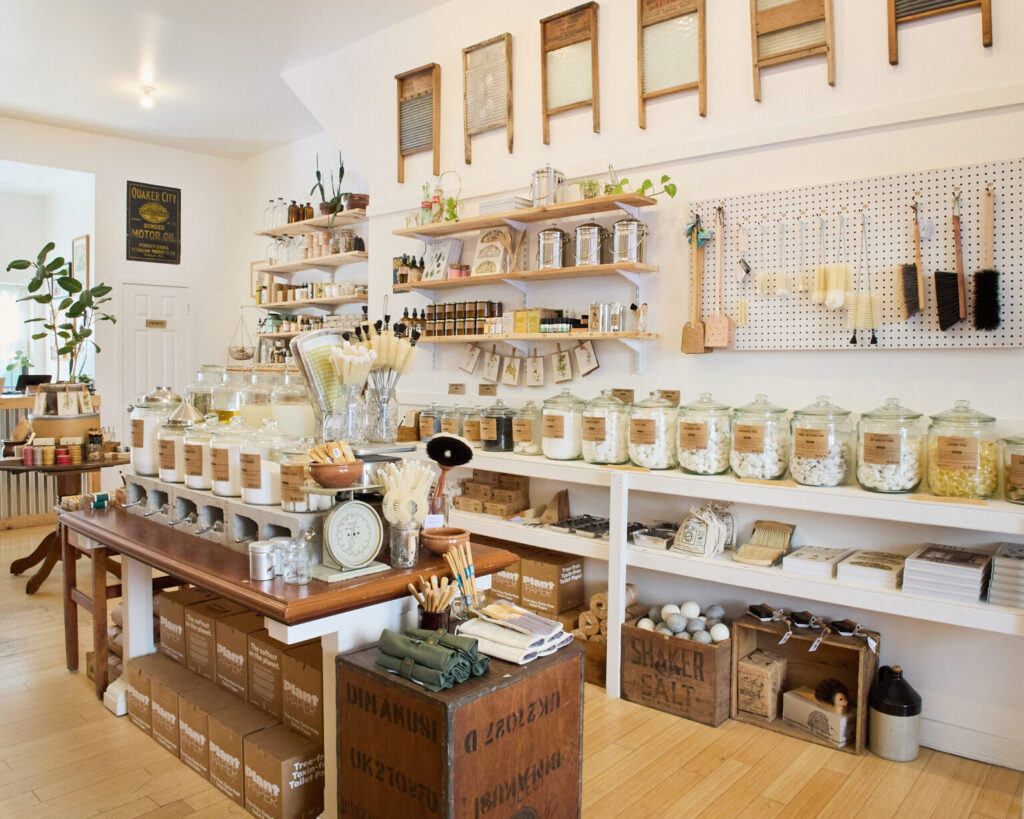
One of the most wasteful kitchen products is disposable liquid dish detergent in plastic containers. “You can bring in your own bottle and buy our bulk natural dish detergent in liquid or bar form,” said Emily. “You don’t have to buy large quantities and keep a gallon under your sink. Just refill your small container.”
Emily encourages customers to compost rather than put food waste down a garbage disposal. “That greatly reduces things going down your drain into a waste treatment plant. We are selling a stainless steel compost bin to keep under the kitchen sink.”
If you already have a well-stocked sustainable kitchen, you may want to encourage a friend by gifting them a starter kit for their housewarming, birthday, or any special occasion. “It’s a good alternative to a bottle of Champagne,” said Emily.
If you don’t have time to make your own compost, sign up for a local composting service like Bennett Compost or Circle Compost that will provide a bin and pick up your compost regularly. To learn more about composting, check out our post on composting 101.
Eating Sustainably
Knowing how and where your food is sourced is key. Since opening in 2020, South Philly Food Co-op, 2031 S. Juniper St., is the only community-owned grocery store that offers fair trade and sustainably produced foods free of harmful additives and chemicals. “People were super excited when we opened because it was a ten-year process and our customer base has grown exponentially,” said Co-op General Manager Lori Burge. “More folks keep coming in for the first time.”
Now serving 2,000 households, the Co-op is also open to non-members and has partnered with community businesses and organizations. “We are near South Philly High and work with students, displaying their art in our store,” she said. “We also donate to the school’s food pantry and give coupons to teachers.” The Co-op also collaborates with other local sustainable businesses to which they offer discounts, including housewares, yoga, acupuncture, and restaurants.
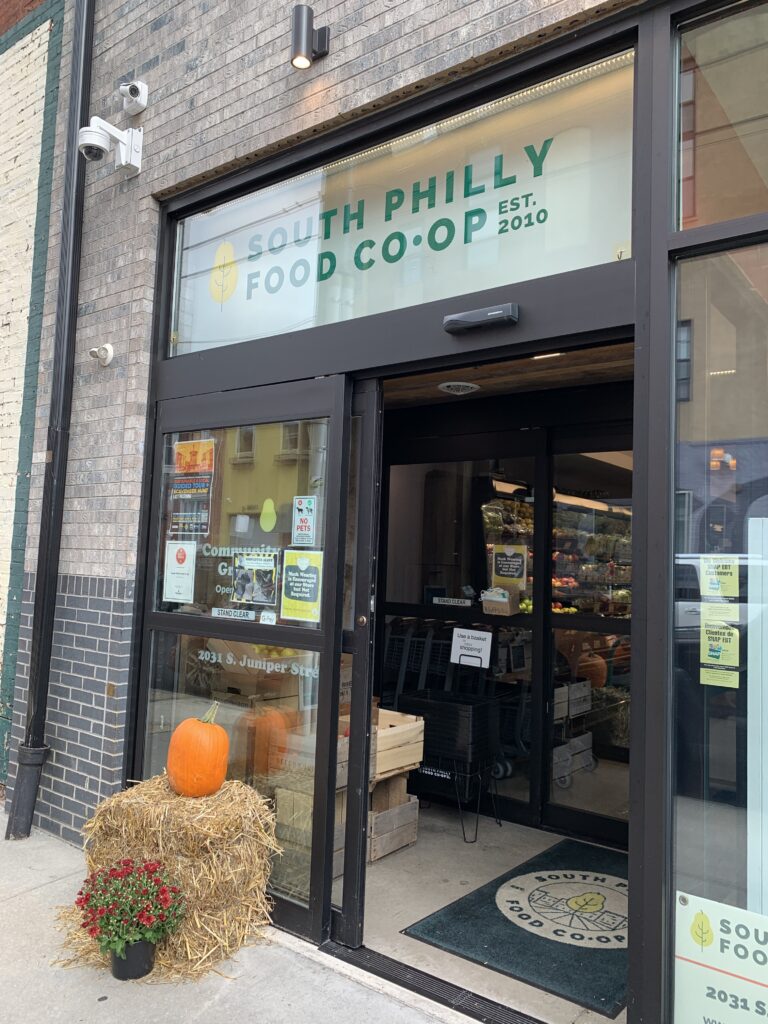
Besides offering local, farm fresh produce, dairy, and meats, the Co-op sells vegetarian and vegan sandwiches from Moshe’s and other items from Rowhouse Grocery. “We also have soups, salads, and wraps,” said Lori. “Our Sweet Potato Chili and Italian Wedding Soup is very popular.” The Co-ops fresh fish from Samuels and Sons, Philly’s top seafood supplier. “Our bagels are from Vanilya on Passyunk and our breads are from Merzbachers in Germantown,” said Lori. “People can bring their containers for our bulk department which carries whole grains, legumes, nuts, granola, baking ingredients, and coffee.”
“We are not just here to make a profit,” she said,” We are here to serve our community and to try to create a sustainable local economy,” said Lori.
Herbs & Spices
Philly chef, culinary tour leader, and cookbook author Aliza Green, who wrote The Field Guide to Herbs and Spices, tracks down international spices and herbs throughout the city. “I find a nice selection of fresh herbs at Sue’s Produce, 114 S 18th, Maxx’s Produce, 255 S 20th St, and when in season at the Rittenhouse Farmers Market on 18th & Walnut St.,” said Green. “The Asian markets on Washington Avenue are good sources for cilantro, parsley, and mint. Some of the Mexican markets in the 9th Street area carry canela (soft-stick cinnamon) and dried whole chiles.”
Bob Skiba, curator at the Williams Way Center archives, maintains a serious foodie following on Facebook where he posts daily, innovative meals-on-a-budget featuring local sources. When it comes to spices and herbs, Skiba frequents The Head Nut in Reading Terminal Market. “I also shop at Penzeys at 233 Market. They have excellent quality dried herbs and spices and they actively support liberal politics,” he said. “For fresh herbs, it’s the Italian Market stalls for me, Giordanos’ in particular. Whole Foods also carries small packages of herbs from local growers, which I like to support.”
Kitchen Tools, Serveware & More
The most sustainable option is always going to be to use what you already have. However, when it’s time to replace your heavily worn-down spatula or broken kitchen tools, opt for wood, bamboo, or stainless steel over plastic. Silicone is a better alternative than plastic as it is a synthetic material designed to be heat-resistant and long-lasting but keep in mind that it is not 100% sustainable as it doesn’t biodegrade and can’t be recycled.
Glass is a very sustainable choice for kitchen storage and serveware as it can be recycled time and time again, keeping waste out of the landfill. Finished with a jar of jam? Consider cleaning and reusing them for dry storage in the kitchen! Glass is non-porous which means it is much cleaner than plastic and doesn’t absorb smells, making it a great option for tupperware.
While glass is very much recyclable, unfortunately, most cities do not have the infrastructure to recycle it properly. Philadelphia-based company Remark Glass and their non-profit arm Bottle Underground, collect bottles from the community that would otherwise end up in landfills and aim to close the loop by turning them into beautiful pint glasses, barware, decanters, bowls, and more. Support a local business and reduce glass waste at a local level by adding sustainable and stylish serveware to your cupboards and dining table.
No matter what level of sustainability you can achieve in your kitchen, we encourage you to find ways to expand your efforts. Small steps can make a big impact!
Interested in learning other ways you can help reduce your environmental footprint? Check out our article on Four Ways to Minimize your Waste Footprint in Philadelphia or our list on 5 Things Philly Renters can do for the Environment. If you’re a Solo tenant or owner and want to sign up for a special 2 month trial offer from Bennett Compost, please e-mail us!





